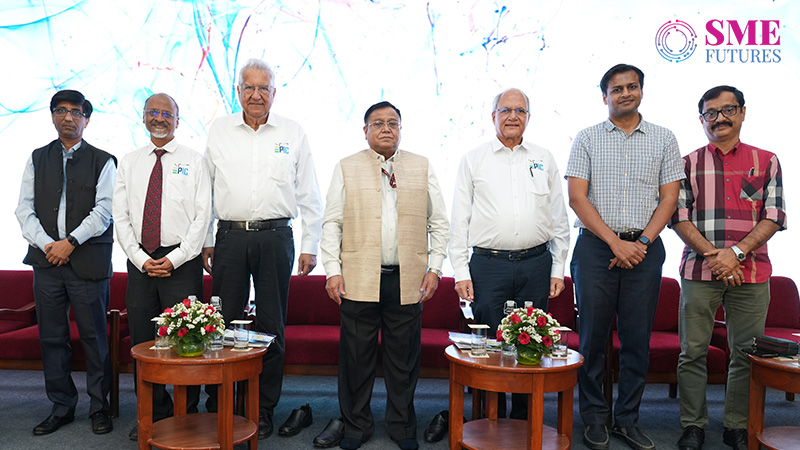To resurrect India’s domestic electronic and semiconductors industry, HCL Founder Dr Ajai Chowdhry, along with fellow HCL founder Arjun Malhotra and semiconductor industry veteran Dr Satya Gupta, recently launched the ‘EPIC Foundation’ to bring Indian products and brands for electronics of national importance.
EPIC Foundation, according to IT veterans, was founded with two primary goals in mind: to create “Indian” Electronics products and “Indian” Brands in High-Impact/High-Volume categories, and to drive demand for semiconductor chips by scaling the volume for these Indian electronics products.
“Our aim is to take Indian electronics to real Aatmanirbharta, from the design of electronics products to the manufacturing and design and manufacturing of semiconductor chips,” said Dr Ajai Chowdhry, Chairman of EPIC Foundation at the launch event.
“We will work closely with all industry associations, academia, industry and government to achieve EPIC foundation’s mission,” he adds.
Over the last 3 decades, Indian Electronics Brands and Products have seen a continuous decline and today, there are hardly any Indian brands and products in the high-volume electronics product categories. Today the market share of “Indian” products and Brands is less than 10 per cent out of US$180 billion market for electronics products.
Foundation to aid SMEs
Talking to the SME Futures, Dr Satya Gupta, CEO of the newly incepted organisation talks about how the foundation will spearhead small and medium businesses towards their growth. “SMEs will take the charge of the development of domestically designed and manufactured products. Mostly it’s the designing part that MSMEs will do,”
Although SMEs could also take up manufacturing, however considering the speed and quantity of products delivery, the manufacturing units are going to be large. “Hence it’s appropriate that SMEs will get to play a role in designing units of products only,” he adds.
Made in India products
Along with the establishment of the foundation, the organisation announced the release of two indigenous products: an Indian 10.1-inch tablet called MilkyWay, and an LED driver chip, which has a 700 million unit consumption and is expected to reach a billion unit consumption in the coming years.
Telling us more about the newly launched products, Dr Gupta said, “The tablet has been developed and designed in a way that differently-abled people would be able to use it, as it works on voice interface, AI/ML-based inter-lingual translation for different Indian languages. Going ahead we are planning to include around 20-30 gestures-based interpretations also,”
The foundation plans to give away these tablets to NGOs working for the differently-abled section of the society, he adds.
Speaking of the LED driver chips, Dr Gupta said “With LED chips, the roadmap is to get the chips designed in the coming three-six months. Secondly, finding a manufacturing partner initially globally and then in India. Thirdly, to target 700 million LED bulbs production in India to place their chip,”
According to EPIC Foundation, the chip production would reach a billion units in two-three years in-fact, supported by ELCOMA, the Top-10 LED product company, manufacturers have agreed to buy this chip.
Aim to build a strong eco-system
To achieve the said targets, and build a strong eco-system of partners, EPIC Foundation has signed MoU with the Delhi government and various collectives such as IIT Kanpur, IIT Madras, and other industry associations.
Speaking on the various partnerships, Dr Gupta spoke about the recent MoU signed between IESA and SIA (Semiconductor Industry Association of America).
He said, “As long as we have product ownership, to let the ecosystem work, we need the global partnership and collaboration. We cannot start the whole manufacturing in one day, our main aim is to establish the FAB (semiconductor fabrication plant), we cannot have the whole ecosystem on our own, so for that reason, we need the global partnership.”
“We must need partnerships with global organisations like SIA, SEMI, JETRO, etc., for the betterment of the semiconductor industry globally,” he added.
Informing us about their roadmap ahead, Dr Gupta said that they are planning to come up with a smart surveillance camera (CCTV) and e-passport chip as their next series of products.
“The MiliyWay tablet will be out in the market within the next quarter with the first version, while the second version could come around in the next six months. Every six months we’ll keep bringing new versions. For the LED chip, we can bring it up in about a year, but first, we need to figure out all the commercial aspects,” he said.
Speaking of the challenges, Dr Gupta feels that the biggest challenge will always be convincing their consumers. “Whether it is a tablet requirement from a state or a LED chip requirement from any manufacturer, for both of them, we need to convince the consumer to buy the home-made product that has the same or better quality and life span, better features, prices and durability and all of those things.”
“Even if we are a non-profit organisation, we have to work as a commercial company, otherwise we’ll not be successful,” concludes Dr Gupta.











